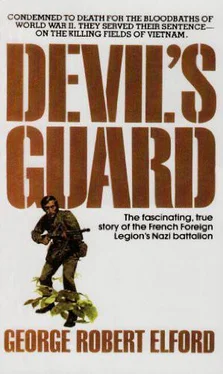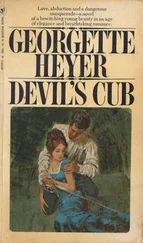“That’s what I figured, Xuey.”
“We can’t plug them on that evidence,” Krebitz commented.
“I guess we can’t.”
“You may return to your work.”
I dismissed Van Ho and his companions. “And keep out of the war.”
“The French must be very frightened in our country,” he said, now vastly relieved.
“Maybe they are,” Riedl replied, shouldering his gun. “We aren’t.”
“You should return home. Our people could take care of themselves.”
“Once we are gone your people won’t have to bother. The Viet Minh will take care of everything,” Krebitz said.
“Why should that bother you, sergeant?” Rudolf shot a sharp glance at Van Ho. “What bothers me is that you seem to know my badges well enough but you keep addressing the others only as “officer.* I wonder why is that so?” Van Ho declined to offer an explanation, and I decided it was time to proceed.
“Sergeant Krebitz!” I called. “We are moving out.”
I winked at him and he winked back. “Assemble!” The villagers watched us leave, then they slowly dispersed and began to work as if nothing had happened. Our trial number one ended. Now came test number two.
Balancing on the slippery logs that bridged the irrigation canals, we returned to the dirt road and marched off skirting the paddies. At a quiet command of Krebitz our sharpshooters dropped into the roadside shrubs; from the moisture-proof holsters emerged their precious rifles with their telescopic sights, silencers, and hair-trigger mechanism. The battalion moved on. Soon there was a good four hundred yards between us and the workers and my men began to wonder. Maybe we were wrong about the villagers. Even Xuey could err.
Distance five hundred yards. Our advance guard was entering the woods.
“A terre!” someone yelled. “Take cover!” From the paddies came the vicious clatter of a heavy machine gun. Yet the moment we took cover the shooting abruptly stopped. Focusing my field glasses I spotted half a dozen shapes scurrying across the ponds. Three of them staggered and fell, then a fourth one spun about and dropped out of sight. Our marksmen were still at work. The last of the fugitives collapsed only a few steps from the forest sanctuary on the far side of the paddies.
Near the low platform which we had so carefully examined now stood a small boat with a mounted machine gun; two corpses sprawled on the platform and two more hung from the boat with head and shoulders submerged in the murky water.
We backtracked on the road to meet our Abwehrkommando and by the time we arrived the men had already cleaned their weapons; the sensitive scopes were capped and the muzzles plugged with small rubber corks taken from empty medicine vials. When they saw me coming they rose but I motioned them back.
“You made short work of them,” I commented with a gesture toward the paddies.
“Child’s play,” Corporal Walther replied, and the men acknowledged my appreciation with a smile. “There is nothing about Germans and silencers in Mao’s library on guerrilla warfare, so what could the poor devils do?”
“Carry on!” They sat back to enjoy their cigarettes; a peculiar bunch of men, as cool and indifferent as they were unerring. Their sole task being the killing, they were utterly disinterested in the gory details and would seldom bother to pay a second glance at their victims. The postmortem undertakings were left for Sergeant Krebitz and his Gruppe Drei.
Into the paddies again. The guerrillas lay where they had fallen. Now every one of them was armed with rifles and Mitras, including the women. A number of yellow watertight bags floating around the platform explained where the weapons had come from. They had been kept submerged in the bottom mire until the enemy thought the time was ripe for a sneak attack.
“Poor all-too-clever Monsieur Van Ho Tien,” Erich commented over the corpse of the little Indochinese. “You had known so much yet you knew so little.”
He turned toward me and added, “He could have been of great service to his country—somewhere else.”
I examined the corpses; head, face, and neck wounds and no misses. The machine gun, a Soviet Goriunov, was a clumsy weapon but accurate up to a thousand yards. It had fired only fifteen rounds before its crew died, and to appreciate the skill of our experts one should remember that to fire fifteen rounds had consumed only 1.4 seconds.
How could the enemy produce the Goriunov (weighing nearly seventy pounds) while under constant surveillance remained an enigma. “We saw some brisk comings and goings with baskets and sacks between the shelter and the woods,” Corporal Walther explained to me later on. “Then came the boat seemingly laden with empty baskets. All of a sudden there was the gun spitting fire and we blazed away.”
One of the machine gun crew was a young woman, the wife of a gunner. Later we learned that they left behind two children, now orphans, because of a senseless raid that was doomed from the very beginning. One needs more than a European mind to understand the Oriental mentality.
Sergeant Krebitz quickly dismantled the machine gun and scattered its parts all over the paddies. The ammunition we trampled into the bottom mud.
Forward! Three hours later we arrived at Van Ho’s village. Its dwellings were vacant, the road and the yards deserted; the hamlet gave every sign of a hurried evacuation. We searched the huts and the hillside and discovered a complex tunnel system still under construction. The slopes of the hill contained a labyrinth of dug-in positions for mortars and machine guns which were connected by caves and tunnels to provide living quarters and storage space for weapons, food, and ammunition. There were several levels of tunnels, many of them with multiple exits, and some suitable for smaller field artillery pieces. The fortification complex was to be a major Viet Minh storage and training center.
The muddy trail revealed many footprints of men and beasts heading for the hills. In front of one hut a trooper discovered Chinese cartridges trampled into the mud. From one of the cellars came a broken mortar. I ordered” the tunnels blasted and the huts demolished, which job Sergeant Krebitz accomplished in three hours. Then leaving behind Gruppe Drei to set a trap, we moved on in full view for the benefit of all guerrilla spies who cared to look.
Soon after we left the population emerged from the woods and crowded in on the narrow trail; men, women, and children driving heavily laden carts, pushing wheelbarrows and bikes burdened with crates and sacks. Gruppe Drei rushed forward and captured the milling crowd before they could utter a cry. Krebitz’s booty was a rich one—weapons and ammunition enough to sustain a Viet Minh company for at least a month of prolonged fighting.
Acting on my orders, Sergeant Krebitz spared only women, children, and old people. The entire male population consisting of about fifty men was executed. The destruction of enemy manpower had always been our principal aim in Indochina, and we had no alternative. The Viet Minh could always excavate new tunnels, could always obtain new weapons and ammunition from across the frontier, but not even Ho Chi Minh could manufacture trained guerrillas.
With guns blazing our troops marched up and down the trail shooting up bullocks, pigs, hens, weapons, and other guerrilla hardware until destruction was complete. Another lesson of war told in the language of the Viet Minh.
Whizzz… whammmm… A cry of agony; a trooper staggers, his hands grasping a tree for support; then he folds up and lies moaning in the grass. From his abdomen projects the shaft of a three-foot arrow spilling blood and partly digested food onto his clutching hands and tunic. The troops scatter to take shelter. There is not much they can do but squat low and scan the sinister jungle. Bows make no report. There is no telltale smoke or muzzle flash to draw one’s attention. But we know that the sniper is not very far away. One cannot shoot far in the jungle.
Читать дальше












